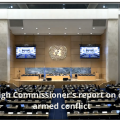My name is Christine Mirre, director of CAP Freedom of Conscience, which is a European NGO granted with ECOSOC Consultative Status at the United Nations, dedicated for 25 years to the respect of human rights.
It is an honor to open this international conference, “The Right to Return in International Law,”
jointly organized by CAP Freedom of Conscience and the Western Azerbaijan Community, with media support from Bruxelles Media.
The program brings together experts, policymakers, and scholars for focused dialogue, including conceptual framing, panels on cultural heritage and property rights, a documentary screening, and structured opportunities for exchange.
I am pleased to share this opening session with
Mr. Aziz Alakbarli, Chairman of the Executive Council of the Western Azerbaijan Community, and Dr. Ventzeslav Sabev, Co-Director of the Observatory on Security at the University of Geneva.
Our focus today is both legally grounded and human-centered. The right to return is recognized across seminal instruments of international human rights and humanitarian law. The right to return is firmly anchored in international law.
Article 13 of the Universal Declaration of Human Rights affirms that everyone has the right to leave any country, including one’s own, and to return to one’s country.
Article 12 of the International Covenant on Civil and Political Rights specifies that no one shall be arbitrarily deprived of the right to enter his own country.
In international humanitarian law, Article 49 of the Fourth Geneva Convention prohibits forcible transfers and deportations of protected persons from occupied territory and provides that those evacuated should be returned to their homes as soon as hostilities in the area have ceased.
Operational guidance further clarifies how this right can be realized.
The Guiding Principles on Internal Displacement, notably Principle 28, call on authorities to establish conditions for voluntary, safe, and dignified return, resettlement, and reintegration, without discrimination.
The Pinheiro Principles on housing and property restitution underscore that restoring housing, land, and property rights is integral to durable solutions.
Regional jurisprudence—including case law of the European Court of Human Rights illustrates that effective remedies may encompass restitution, compensation, and measures to remove obstacles to return where feasible and lawful.
The legal architecture, however, is only part of the picture.
The human dimension of return is central.
The right to return engages human dignity because it concerns the restoration of an individual’s and a community’s relationship with home, identity, and place. Displacement fractures social ties, interrupts education and livelihoods, and erodes the intangible cultural heritage transmitted across generations.
Cultural heritage, both tangible and intangible, is deeply implicated in return processes.
Tangible heritage—such as religious sites, cemeteries, libraries, monuments, and historic neighborhoods—serves as a record of presence and continuity.
Intangible heritage—languages, rituals, craftsmanship, and oral histories—anchors identity even through displacement, but often relies on return for full revitalization in its place-based context.
Today’s panels will explore the protection of cultural heritage under international law, bearing in mind relevant frameworks such as the Hague Convention for the Protection of Cultural Property in the Event of Armed Conflict and complementary UNESCO standards.
The linkage between the right to return and heritage protection is practical: safeguarding heritage facilitates sustainable return, while return often provides the social context necessary to maintain and transmit heritage.
Property rights are equally fundamental. Restitution, compensation, or other equitable remedies are instrumental in enabling return.
The right to return also intersects with security and public order considerations. International law acknowledges that returns must be viable, meaning that safety, demining, basic services, and the rule of law are in place.
Authorities have a responsibility to remove obstacles to return, provide documentation, and ensure equal access to public services.
Monitoring by independent bodies, including national human rights institutions and international organizations, supports transparency and trust.
In closing, may this conference contribute to clarifying the contours of the right to return, strengthening the protection of cultural heritage, and advancing fair and effective property restitution mechanisms.
I look forward to the discussions ahead and to the concrete recommendations that will emerge from our exchanges today.
Thank you.
More information
Brussels hosts international conference on right of return for western Azerbaijanis
https://caliber.az/en/post/brussels-hosts-international-conference-on-right-of-return-for-western-azerbaijanis
Conference on right of Western Azerbaijanis to return held in Brussels
https://www.thecaliforniacourier.com/conference-on-right-of-western-azerbaijanis-to-return-held-in-brussels/
Brussels hosts international conference dedicated to right of return of Western Azerbaijanis to their native lands
https://azertag.az/en/xeber/brussels_hosts_international_conference_dedicated_to_right_of_return_of_western_azerbaijanis_to_their_native_lands-3827707
Qərbi Azərbaycan TV
https://www.youtube.com/watch?v=UI7G8SgCrWk






